Billy Murdoch ... Australia’s first world-class cricketer
Australia’s ‘Cricketing Colossus’ Billy Murdoch has been honoured for his trailblazing feats. His story makes fascinating reading.
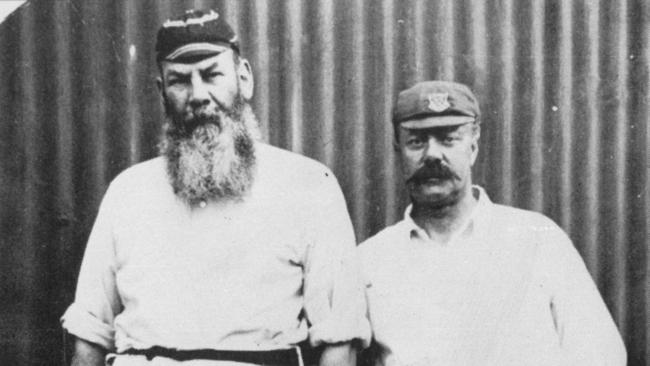
Sometimes a book is published only for a late-breaking development to undermine a key assertion. This can be disappointing and frustrating.
For the authors of a new biography of the Australian cricketer Billy Murdoch, however, the occurrence will be welcome.
In Cricketing Colossus, which will be launched today at the Melbourne Cricket Ground, Richard Cashman and Ric Sissons argue Murdoch, maker of the first Test double century and the first Australian first-class triple century, should at once be inducted in the Australian Cricket Hall of Fame “to rectify more than a century of neglect of this great player”.
They were not to know that even as they wrote this the decision had been made to do so — by, among others, me — ahead of its announcement at Monday’s Australian Cricket Awards.
Murdoch was indeed, as Cashman and Sissons argue, “the first Australian batsman to develop a world-class reputation”; maybe, also, the first captain.
Murdoch presented Australian batting credentials at the earliest opportunity, at The Oval during Australia’s inaugural Test in England, where W.G. Grace made 152, and Murdoch replied with 153 not out.
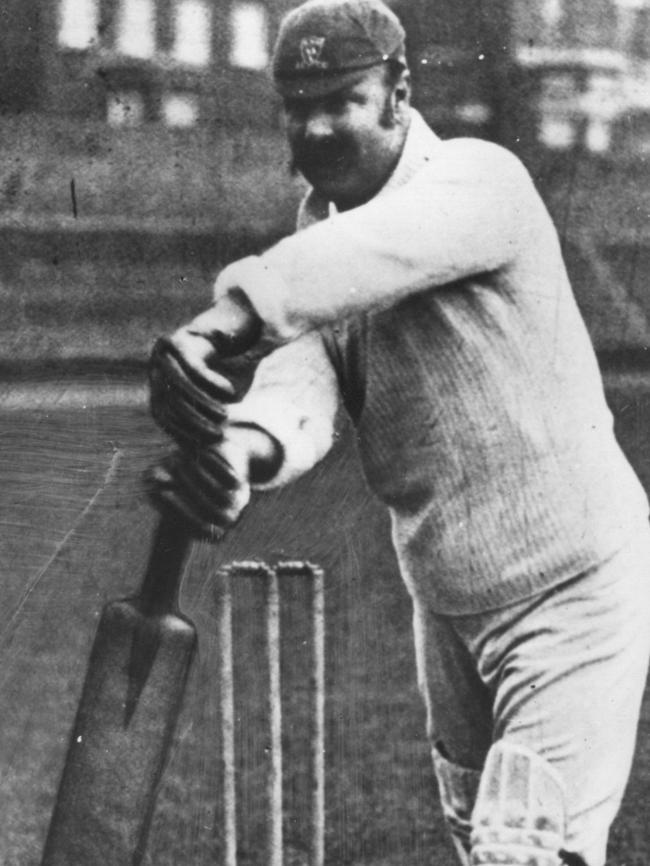
His leadership spurs were gained on the same ground two years later when he led Australia to a first Test victory abroad, in the match from which emerged the Ashes tradition.
One of the reasons for his overlooking ever since, I suspect, has been the lack of a thorough biography — a service that, among the players of Murdoch’s generation, Cashman has performed for Fred Spofforth and Sissons for Charlie Turner.
And the reason for this is that Murdoch does not surrender readily to researchers: David Frith observes in his foreword that Murdoch’s “vacillating fortunes read like a novel”. He is a sporting Richard Mahoney.
Has any Australian cricketer, for example, had such an incomparably vivid patrimony?
When American Gilbert Murdoch married Tasmanian Susanna Flegg in California in 1851, he was 25 and she was 15.
Gilbert had been a corporal in a Maryland volunteer regiment involved in the Mexican War and served as the second mayor of Monterey as part of a corrupt and violent Democrat clique. Susanna was the daughter of illiterate convicts, travelling with her mother and a consignment of goods on what was virtually a pirate ship.
No sooner had the newlyweds returned to Hobart than the Victorian goldfields beckoned, where Billy would duly be born, and Gilbert become a flamboyant scapegrace, a merchant and auctioneer always on the edge of the law, eventually toppling into jail in Bathurst and Beechworth.
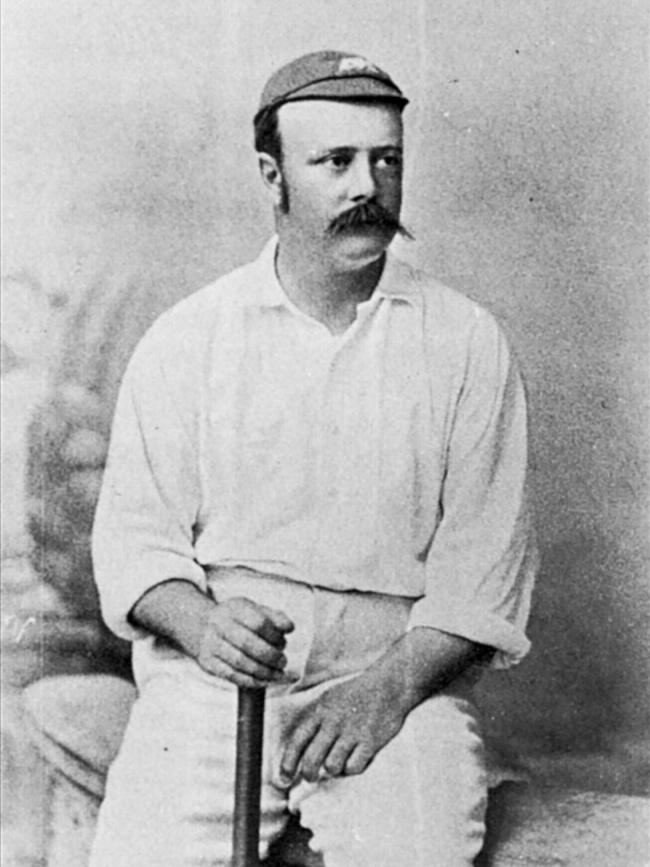
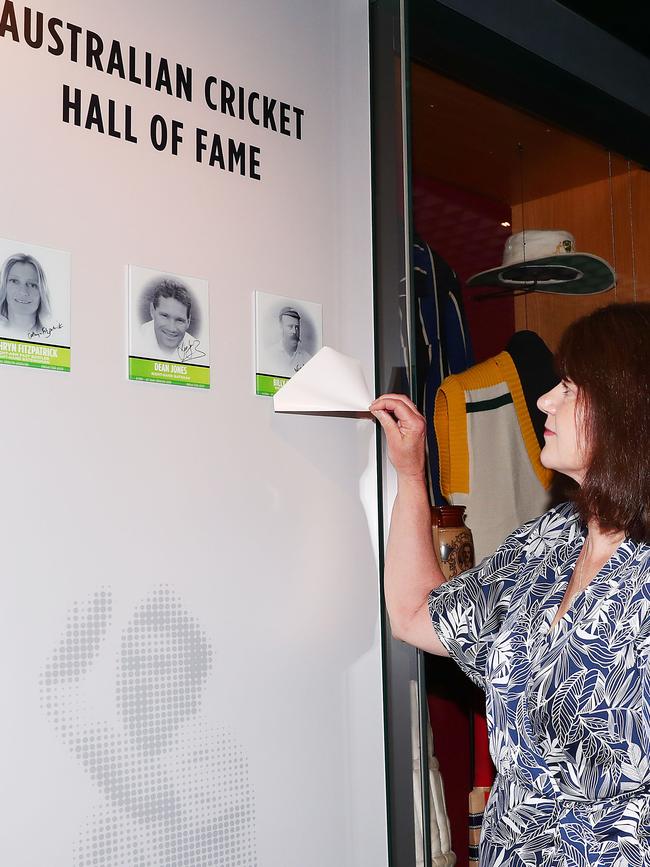
Later profile writers drew a veil over Gilbert’s infamies but Cashman and Sissons believe he abandoned his family circa 1856, when Billy was an infant, and quit Australia just over a decade later.
Returning to Monterey, he claimed his family had perished in a shipwreck after which he had escaped from savages. Setting up as a greengrocer, he contracted a bigamous marriage to an epileptic women 30 years his junior.
Of the impact on Billy, the authors largely decline to speculate.
But there assuredly emerged competing parts of his character: a strong streak of entrepreneurship combined with a tendency to improvidence versus an arriviste’s craving of respectability.
This suited the Australian cricket teams he led between 1880 and 1884, which played with an aggressively commercial intent while also arrogating to themselves the socially privileged status of amateurs.
But it mainly showed up in his life, where he had an early brush with bankruptcy, then married money or, to be more exact, eloped with it, hastily wedding a daughter of mining tycoon John Boyd Watson.
As if in atonement, Murdoch renounced cricket between the ages of 30 and 35 in favour of the life of a country solicitor, only resuming when old man Watson died — Murdoch promptly returned to Sydney and was ceded the Australian captaincy for the 1890 Ashes tour.
The team was a flop but the trip facilitated Murdoch’s relocation to England, whose leisure class his family joined. He returned to Australia only twice in his remaining two decades.
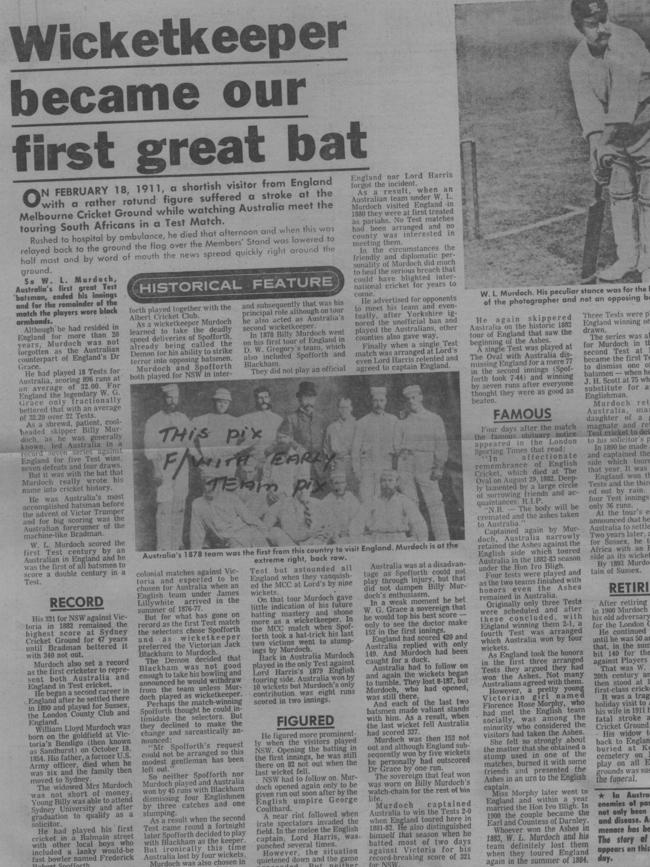
Mind you, this outwardly cheerful and festive existence proved harder to sustain than the family let on. Cashman and Sissons have obtained some fascinating begging letters to the Watson estate in which Murdoch’s wife touchingly if enigmatically defends his honour: “Other than his one little fault he could not be a better husband to me.”
Though Murdoch would play many years for Sussex, it also queered his Test career.
In addition to his residence, Murdoch’s visit to South Africa with a team of English cricketers in 1891-2, including a match retrospectively accorded Test status, seems to have confounded his expectation of leading the next Australian team to tour England.
From Sydney, its manager Victor Cohen counselled Murdoch candidly that “there is a decided antipathy to the inclusion of any Anglo-Australians out here”.
Murdoch’s retort was to call himself “an Australian pure and simple”. But his need for such insistences implied the opposite. It could be argued that he fell victim to prejudices he played a part in instilling, the achievements of Australian cricketers building a proto-national consciousness.
A year before his death in 1911, Melbourne Punch commented cattily on Murdoch’s diffuse allegiances: “The old cricket captain is thoroughly anglicised now and regards Australia with horror as a little place set by itself as far as possible from everywhere else.
“He has become cosmopolitan, and cannot bear the thought of being more than a day’s journey from London, Berlin, Vienna, Paris, St Petersburg. That is the worst of a long and wealthy residence abroad, the best Australians becoming un-Australianised under such conditions.
One hundred and nine years later, the 52nd member of the Australian Cricket Hall of Fame is in a category with a membership of one: he is the first and only inductee to have also represented England.
Billy Murdoch: Cricketing Colossus by Richard Cashman and Ric Sissons, $50 (Walla Walla Press), will be launched today in the library of the Melbourne Cricket Club at 1pm.


